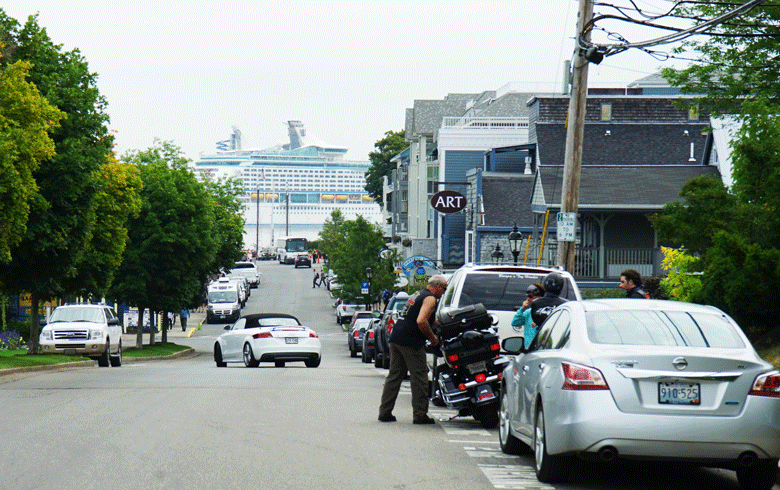On paper, Bar Harbor was expecting more than 150 cruise ship visits this year.
In reality—fat chance.
The COVID-19 tsunami finds the global cruise ship industry in shambles and has left traditional ports of call, including a handful in Maine, with many more questions than answers.
“We need to figure out how to live with or without cruise ships…”
—Jill Goldthwait
The world’s largest cruise ship operator, Carnival, estimates it burned through $530 million a month during its most recent fourth quarter, given debt payments, commissions, deposit refunds, and other financial obligations. Smaller competitors such as Royal Caribbean and Norwegian cruise lines have been dealing with monthly cash burns of $270 million and $175 million, respectively.
Carnival recently sold at least 18 of its fleet’s cruise ships, some to new owners, others to be scrapped as the industry takes on the heavy lifting required to reinvent itself after cruise ships were determined in 2020 to be among the earliest vectors of the ongoing, global spread of the COVID-19 pandemic.
Beyond the economic bleeding, cruise ship operators and their ships’ ports of call are overwhelmed by pandemic-induced restrictions and regulations. An unprecedented “No sail” order last March from the U.S. Centers for Disease Control wound up scuttling U.S. cruise ship revenues in 2020. State, federal, and international cruise ship health requirements and safety protocols remain a moving target.
On the same afternoon that Bar Harbor’s town council met in early January to sort through and discuss a litany of unknowns, COVID-19 hospitalizations and deaths hit record levels, in Maine and elsewhere.
Coastal Maine has six deep-water ports than can accommodate cruise ships: Bar Harbor, Portland, Bucksport, Eastport, Searsport, and Rockland. The “Old Port” waterfront in Portland includes Maine’s only cruise ship terminal, which accommodates significantly fewer ships than does Bar Harbor, where cruise ships anchor offshore, using tenders to ferry passengers to and from shore to attractions on Mount Desert Island, including Acadia National Park.
Eastport has had some recent success in wooing small cruise ships—think 400 passengers, not 4,000—but has the infrastructure and capability to host cruise ships of any size.
“With the ‘no sail’ order in place, we are very much in a wait-and-see situation,” said Chris Gardner, who oversees the Eastport Port Authority. “The industry is in complete and total flux and will have to be reconfigured. We have a great relationship with the industry. Whatever they are eventually allowed to do, Eastport is ready to welcome them back. I think 2021 will be a very interesting year.”
Jill Goldthwait, a Bar Harbor town council member, says a potentially limited 2021 cruise ship season affords the town a chance to seek guidance from its 5,500 year-round residents and others invested in the local cruise ship economy. The council, she said, is now considering a community-wide survey, using the results to help determine policy for coexisting with cruise ships and the tens of thousands of passengers and crew they bring ashore. That consulting project could be funded through the town’s cruise ship revenue set-aside.
“There is a very deep division within the community, including very many community members who don’t want the level of cruise ship activity that we have had,” she said. “We’ve never seen this level of intensity. But we need to figure out how to live with or without cruise ships, which has financial implications for the town’s budget. The cruise ship revenue may go away, but the programs that revenue is funding will not go away.”
Goldthwait said she has seen a growing local interest in the environmental impact of cruise ships, either while anchored just offshore or underway.
“There are those who feel it is not possible to have an environmentally friendly cruise ship.”
Bar Harbor resident Darron Collins, whose day job is president of the College of the Atlantic in Bar Harbor, expressed some of his concerns in a recent letter to town officials.
“We can have a town with a thriving economy, one that supports local business, and one that sees and understands the long view and not be held captive by the cruise ship industry,” he said. “The cruise ship industry has utterly destroyed magnificent icons of world tourism—the Barcelonas and Venices of the world. I could write a laundry list of the evils of cruise ships—the labor involved, the ballast water, whale strikes, effluent, CO2, etc., but none of those problematic issues would hold a candle to the destruction of place. Cruise ships have turned Venice into a Disney World caricature … and they threaten to do the same with our town.”
Writing as a resident, not a COA official, Collins stops well-short of suggesting a ban on cruise ship visits to Bar Harbor.
“I hope that, as a town council, you take steps to forcefully draw some line in the sand with the industry as a whole. They depend on us. They profit enormously by exploiting our resource. We are in the driver seat, not the other way around. We should, therefore, dictate sensible limits on that industry to preserve some degree of tranquility, to preserve the resource that is MDI, and to preserve the long-term economic, cultural, and ecological integrity of this magnificent place.”





